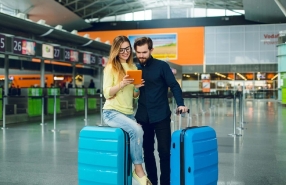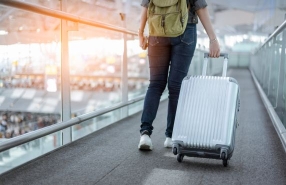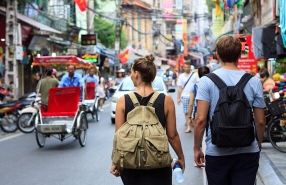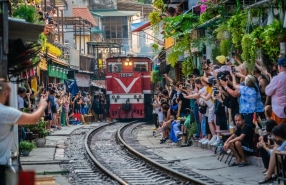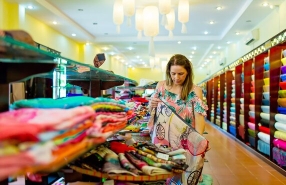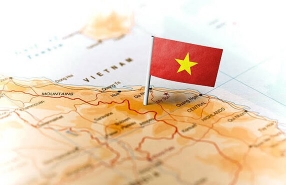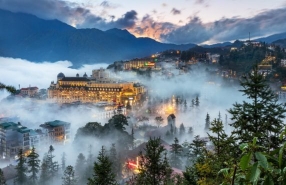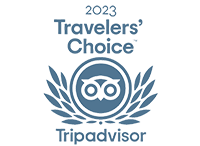Why Visit The Ban Phiet Ethnic Market? Cultural Treasure In Vietnam

Although modest, the Ban Phiet ethnic market is considered by locals to be a hidden gem on the outskirts of Lao Cai city in northern Vietnam. If you are looking for a place less frequented by tourists and steeped in the culture of ethnic minorities, this market is a must-visit for an authentic journey in Vietnam. The detailed guide below will explain why the Ban Phiet ethnic market in Sapa Lao Cai deserves your visit.
Table of Contents
I. Where is Ban Phiet ethnic market located?
The Ban Phiet ethnic market is located in the Ban Phiet commune, Bao Thang district, Lao Cai province, in northern Vietnam.
The Ban Phiet commune is the only border commune in the Bao Thang district, which has been developed for tourism in recent years. Indeed, the natural beauty of this region in Northwest Vietnam has gifted Ban Phiet with an ancestral valley traversed by the Red River, creating a stunning landscape.
Additionally, Ban Phiet is home to many ethnic groups such as the Kinh, Dao, Tay, and Giay. Each week, the day the Ban Phiet ethnic market (Vietnamese name: Bản Phiệt) opens becomes an occasion for these ethnic groups to meet, trade, and exchange goods. The cultural richness stemming from the diversity of the present ethnicities is what increasingly attracts visitors to this unique market.
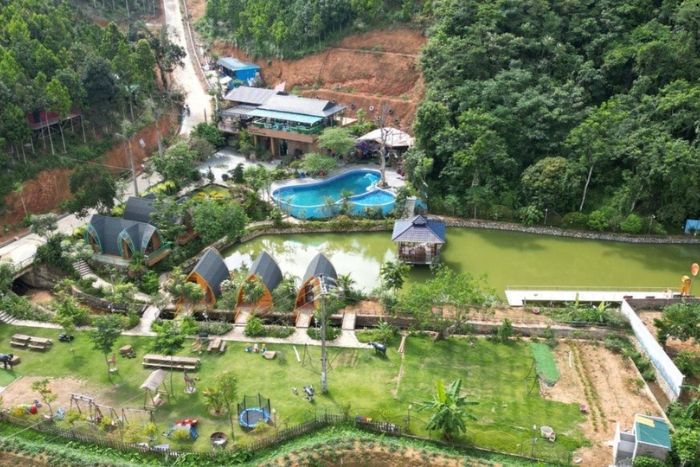
II. When to visit Ban Phiet ethnic market?
The Ban Phiet ethnic market in Lao Cai, Vietnam, is open only two days a week, on Mondays and Fridays, from early morning until around 10 AM.
It is a rare market in Lao Cai that takes place every Monday. The Ban Phiet market also opens on Fridays to give locals and tourists more opportunities to visit. Still unknown to mass tourism, Ban Phiet retains a peaceful atmosphere and preserves the ancestral traditions of a typical ethnic market in Northwestern Vietnam. To fully enjoy this market, it is recommended to arrive early, around 6 or 7 AM, to experience its most lively moments of the day. After 9 AM, the market starts to empty, and the stalls gradually close.
III. How to get to Ban Phiet ethnic market?
Due to tourism development, the road leading to the Ban Phiet ethnic market, located in the center of the commune, has been improved to facilitate visitor access. The commune of Ban Phiet is also on the outskirts of Lao Cai province, so it takes about 2 hours and 30 minutes by road to reach Ban Phiet from Sapa.
You can choose to travel by motorcycle or car. The motorcycle ride will provide an exhilarating experience as you navigate the winding mountain roads. In contrast, traveling by car is more practical if you're in a group, allowing you to enjoy the majestic landscapes on the way to the Ban Phiet ethnic market.
Tip: To get to the Ban Phiet ethnic market, you have to depart from Lao Cai city center or Sapa. These destinations are located in northern Vietnam. Therefore, you'll need to take the road from Hanoi or other northern provinces to reach Lao Cai. Many buses, sleeper buses, and limousines are available at various times, giving you a wide range of options.
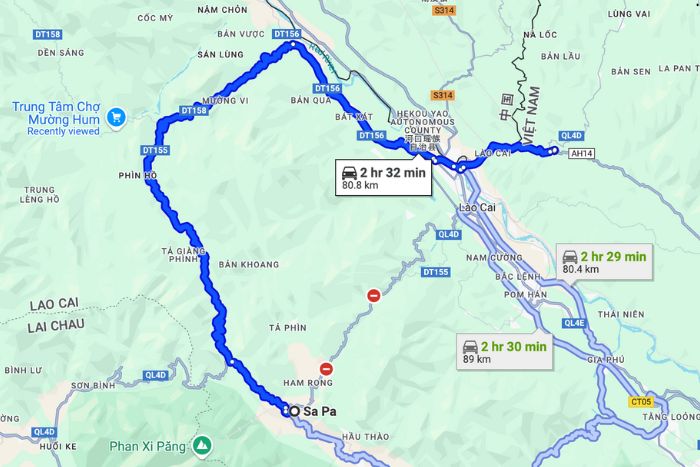
IV. What to do in Ban Phiet ethnic market?
1. Meeting the ethnic minorities in Nothern Vietnam
Although the Ban Phiet ethnic market is smaller than those in Sapa or Bac Ha, it retains its unique characteristics. Among them, meeting various ethnic groups is an unmissable experience at the Ban Phiet ethnic market. This market is primarily frequented by the Hmong, Dao, and Giay people. It starts at dawn, long before sunrise. You can see people transporting their goods to the market as the mist still envelops the surroundings. Locals from nearby villages don their colorful traditional costumes to head to the Ban Phiet market, considering this event one of the highlights of their week.
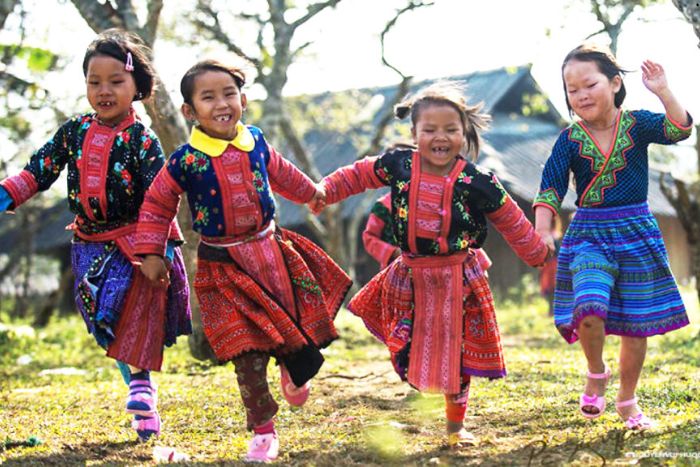
2. Interacting with local vendors at the market
The sellers at the Ban Phiet ethnic market are very welcoming and warm to visitors. They do not pressure customers to buy but greet them with big smiles as soon as they approach their stalls. Although the market is modest and simple, it offers a wide variety of products, primarily agricultural goods grown by the locals themselves. Additionally, you will find handmade items at the Ban Phiet ethnic market, such as embroidered fabrics, traditional clothing, scarves, hats, and belts, all made locally.
A note for visitors to the Ban Phiet market in Lao Cai: it is recommended not to haggle when making purchases. Unlike markets in larger cities, the products at the ethnic market are sold at fixed prices. Due to the difficulties in transporting goods, vendors already offer fair prices to facilitate and speed up transactions.
3. Tasting local specialties at Ban Phiet market
At the Ban Phiet ethnic market, you will also find street food to enjoy during your visit. The market stalls offer a range of typical local dishes that can only be discovered in northwestern Vietnam. You can savor the famous "thắng cố" (a traditional Hmong dish made from horse meat) or a bowl of "bún chả" reimagined with local flavors. The meats offered are also delicious and flavorful, such as “trâu gác bếp” (dried buffalo meat) or “carried-under-arm” pigs (a specialty made from local pig meat). Additionally, corn wine is a specialty of Lao Cai: you will often see people sharing drinks and chatting joyfully at the Ban Phiet market after days without seeing each other.
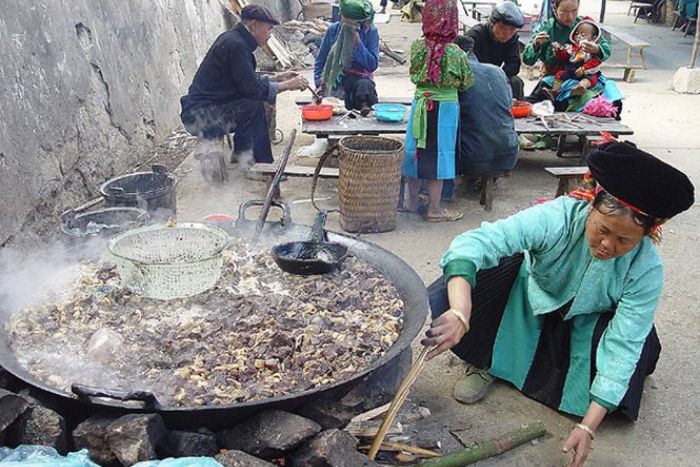
Even located on the outskirts, far from Sapa, the Ban Phiet ethnic market offers an authentic experience for travelers wishing to immerse themselves in the cultural beauty and life of Northern Vietnam ethnic minorities. For any questions about traveling in Vietnam and other Indochina countries, feel free to contact the Vietnam travel company, Autour Asia. Our travel advisors are always ready to help you build the itinerary for your next vacation.
Yes, besides Ban Phiet market, there are several other attractions worth visiting in the region. You can explore the picturesque rice terraces in Sapa, hike to the breathtaking Fansipan Mountain, or visit the charming Bac Ha town, known for its vibrant markets and beautiful landscapes. Additionally, local villages provide insight into the rich cultures of ethnic minorities. For more information about the travel itinerary between attractions, please visit this blog: Sapa travel map.
Photography is generally encouraged at the Ban Phiet ethnic market, as it allows you to capture the vibrant atmosphere and unique cultural elements.
However, it’s important to be respectful and ask for permission before photographing individuals, particularly those wearing traditional clothing.
This courtesy helps to foster positive interaction and ensures that people feel comfortable being part of your photographic experience.
Related travel guide
Other similar articles
CUSTOMIZABLE BY LOCAL EXPERTS
Personalized trip at the original price!
REFUND GUARANTEE
We believe in our work and promise to give you money back.
GOOD PRICE / QUALITY
95% satisfied more than expected!
24/7 LOCAL SUPPORT
We are always available online to provide assistance at any time.
Most read articles
Autour Asia is highly recommended on
Embracing the mission of "Satisfied more than expected" and providing authentic experiences, we have received numerous recommendations on reputable travel forums:











